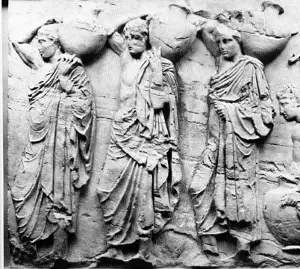Slavery in Ancient Greece and Rome
Slavery was a part of life in nearly every ancient civilization. Particulars varied, but the idea of one person's being owned by another did not. Slaves in Ancient Egypt did the bidding of the king or the otherwise rich and powerful. For the longest time, the working theory on the pyramid builders was that they were slaves. Indeed, for many pyramids, this was the case. However, more recent evidence suggests that the builders of the Great Pyramids more or less volunteered for the job because they wanted to contribute to the glory of the king. Some sources even say that the workers were paid for doing the work. Estimates are that slaves made up no more than 10 percent of the Egyptian population. But Egypt did have slaves, and they did back-breaking work, and they were punished by their overseers, for a variety of reasons, including caprice. The Jewish and Christian traditions mention the enslavement of the Jews, at the hands of the Egyptians and the Babylonians and other Middle Eastern peoples. Slavery was alive in well elsewhere in the Middle East as well. Rules for slaves can be found in two places in the Code of Hammurabi, one of the oldest sets of laws in existence. Slavery existed in ancient Eastern civilizations as well. In these societies, however, slave numbers were not significant, as they were in Greece and Rome. Greece and Rome directed slaves to do a great many things: run households, make food, make wine, run shops, serve in the military, build roads and bridges and aqueducts. 
Slaves in Greece and Rome were foreigners, certainly, but they were also non-immigrants, people who were NOT born Greek or born Roman. A person could be enslaved for all sorts of reasons, including being captured in battle or in a raid or being so far in debt that you had no other hope of paying it off. Slavery was accepted as a concept in Greece. Greeks being Greeks, they made a distinction, however. Athens had laws prohibiting the enslavement of citizens. The citizenry at this time, however, wasn't as wide open as it is in countries today. A citizen in Athens was, by and large, male and prominent and probably well off. At the same time, Greek slaves had a few rights that slaves in other ancient societies did not have. Greek slaves could run a shop, as long as they gave all of the profits to the shop owner, who may or may not have been his own master. If you were a slave in Greece, you could bring a civil suit to trial. You also couldn't be killed, by your master or by anyone else, without permission from the government. Roman slaves were, in large part, prisoners of war or just plain prisoners. Rome did have a fair number of laws, and sometimes the punishment for breaking a law was to be enslaved. Rome had public slaves and private slaves and used them for all kinds of purposes: Roman slaves were clerks, secretaries, even tax agents. They dug graves and mined gold and silver. They ran households and massive Roman gardens. Gladiators were slaves, too. The one right that Roman slaves seemed to have had with relative impunity was in the area of religion. Slaves could worship their own god or gods. Roman slaves had a right to be buried according to the strictures of their religions. This was in line with the multicultural approach toward religion that Roman rulers took until the Christian conversion of Constantine. Even after that, when Christianity was the state religion, Roman masters did not actively interfere on a large scale with their slaves' religious practices. Slaves couldn't marry one another, of course, but they could practice their own faith in their own way, by and large. Slaves were traded in ancient civilizations. They might be traded slave for slave or slave for money or slave for goods. Some merchants set up shop as slave traders, certainly in Rome. |
|
Social Studies for Kids
copyright 2002–2024
David White




